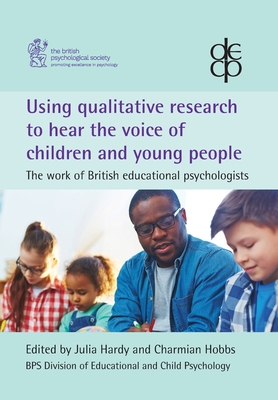Using qualitative research to hear the voice of children and young people: The work of British educational psychologists

Using qualitative research to hear the voice of children and young people: The work of British educational psychologists
It is an obligation on all adults who work with children and young people to enable them to express their views about decisions, which will affect their lives. This obligation is enshrined in the UN Conventions on the Rights of the Child and within UK legislation. Educational psychologists have worked hard to fulfill this obligation and there is much to celebrate in their advocacy with and for children and young people; however this is work in progress, which demands continual reflection and review. This book sets out to explore the ways in which the qualitative methodologies within psychology can support the role of educational psychologists (and others who work with children and young people) to fulfill their role in supporting hearing the voice of children and young people.
This book does not purport to be a comprehensive guide to all possible qualitative methodologies (there are many other available publications which can provide that information) or to be fully representative of all work currently undertaken by educational psychologists. What the book does aim to do is provide:
- A counter argument to the prevailing emphasis on quantitative approaches in educational psychology
- A challenge to dominant ideas about the way in which children are constructed within current professional practice
- An overview of the changes in the practice of educational psychologists in accessing the voice of the child
- A commentary on two qualitative methodologies widely used by educational psychologists - Interpretive Phenomenological analysis (IPA) and Grounded Theory
- Many examples of work based on qualitative approaches undertaken with children and young people whose voice is usually marginalised or absent
- Some thoughts about the further development of qualitative approaches in the work of educational psychologists when accessing the voice of the child.
The book has been produced by the Division of Educational and Child Psychology (DECP) which is part of the British Psychological Society. The Division works to support the professional practice of educational psychologists (EPs) through the provision of professional development, guidance and publications.
PRP: 124.00 Lei
Acesta este Prețul Recomandat de Producător. Prețul de vânzare al produsului este afișat mai jos.
111.60Lei
111.60Lei
124.00 LeiLivrare in 2-4 saptamani
Descrierea produsului
It is an obligation on all adults who work with children and young people to enable them to express their views about decisions, which will affect their lives. This obligation is enshrined in the UN Conventions on the Rights of the Child and within UK legislation. Educational psychologists have worked hard to fulfill this obligation and there is much to celebrate in their advocacy with and for children and young people; however this is work in progress, which demands continual reflection and review. This book sets out to explore the ways in which the qualitative methodologies within psychology can support the role of educational psychologists (and others who work with children and young people) to fulfill their role in supporting hearing the voice of children and young people.
This book does not purport to be a comprehensive guide to all possible qualitative methodologies (there are many other available publications which can provide that information) or to be fully representative of all work currently undertaken by educational psychologists. What the book does aim to do is provide:
- A counter argument to the prevailing emphasis on quantitative approaches in educational psychology
- A challenge to dominant ideas about the way in which children are constructed within current professional practice
- An overview of the changes in the practice of educational psychologists in accessing the voice of the child
- A commentary on two qualitative methodologies widely used by educational psychologists - Interpretive Phenomenological analysis (IPA) and Grounded Theory
- Many examples of work based on qualitative approaches undertaken with children and young people whose voice is usually marginalised or absent
- Some thoughts about the further development of qualitative approaches in the work of educational psychologists when accessing the voice of the child.
The book has been produced by the Division of Educational and Child Psychology (DECP) which is part of the British Psychological Society. The Division works to support the professional practice of educational psychologists (EPs) through the provision of professional development, guidance and publications.
Detaliile produsului









